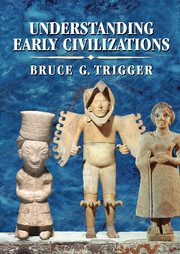Book contents
- Frontmatter
- Contents
- List of Illustrations
- Preface
- Understanding early civilizations
- Introduction
- 1 Rationalism and Relativism
- 2 Comparative Studies
- 3 Defining ‘Early Civilization’
- 4 Evidence and Interpretation
- Sociopolitical organization
- Economy
- Cognitive and symbolic aspects
- Discussion
- References
- Index
2 - Comparative Studies
Published online by Cambridge University Press: 05 June 2014
- Frontmatter
- Contents
- List of Illustrations
- Preface
- Understanding early civilizations
- Introduction
- 1 Rationalism and Relativism
- 2 Comparative Studies
- 3 Defining ‘Early Civilization’
- 4 Evidence and Interpretation
- Sociopolitical organization
- Economy
- Cognitive and symbolic aspects
- Discussion
- References
- Index
Summary
Comparative studies are potentially of great value for understanding human behaviour and cultural change, but all too often a lack of rigour renders them uninformative or even highly misleading. There is never enough information to explain all aspects of any early civilization, and this lack of information has stimulated many anthropologists to extrapolate what is known about one society to other, presumably similar ones. The societies being compared often represent different levels of development, and even societies on the same level cannot be assumed to be sufficiently alike to justify such extrapolation.
It is proposed, for example, that Maya political organization may have had significant ‘feudal’ characteristics, and attempts have been made to understand it better by comparisons with the feudal societies of medieval Europe and premodern Japan (Adams and Smith 1981). Yet, how can such comparisons be justified, let alone prove useful, when so little is known for certain about Maya political organization? While ‘feudalism’ signifies that land is granted by an overlord in return for political support and military service, nothing is known about relations between landholding and political authority among the Classic Maya. In Maya studies ‘feudalism’ tends to be used loosely to refer to any form of delegated authority. Beyond this, the civilizations being compared in this example were not at the same level of development.
- Type
- Chapter
- Information
- Understanding Early CivilizationsA Comparative Study, pp. 15 - 39Publisher: Cambridge University PressPrint publication year: 2003



